|
|
|
Sort Order |
|
|
|
Items / Page
|
|
|
|
|
|
|
| Srl | Item |
| 1 |
ID:
091969
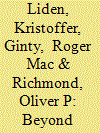

|
|
|
|
|
| Publication |
2009.
|
| Summary/Abstract |
Reflecting the Western-led, international political climate after the Cold War, the various peace operations of the last two decades have sought to build sustainable forms of peace through political, social and economic liberalization. As postulated by liberal constitutionalism and internationalism, these efforts are expected to contribute to international as well as domestic peace by adding the liberalized state to a pacific union of liberal democracies. Their aim is to reproduce the (neo)liberal (meaning a market democracy) sovereign state and a liberal normative and institutional system of government and international governance.
|
|
|
|
|
|
|
|
|
|
|
|
|
|
|
|
| 2 |
ID:
110765
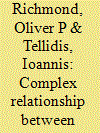

|
|
|
|
|
| Publication |
2012.
|
| Summary/Abstract |
Approaches to terrorism and peacebuilding have a complex relationship with each other, which may be explained according to four categories outlined in this article. These range from blocking each others' aims, nullifying terrorism, supporting a very limited, or a broader peace process. Each of these categories has implications for the inclusion and reconciliation of a wide range of actors and the hybrid nature of the emerging peace. This relates to the critical approach of using theory to create emancipatory forms of peace, which is used as a basis for the examination of the production of hybridity via the interaction of approaches to terrorism and peacebuilding in five cases in this article. These include Sri Lanka, Kashmir, the Middle East, Nepal, and Northern Ireland. We argue that "post-liberal" possibilities for a hybrid form of peace (which are inherent in such conflicts) offer a "post-terrorist" potential for peace processes.
|
|
|
|
|
|
|
|
|
|
|
|
|
|
|
|
| 3 |
ID:
080902
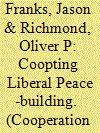

|
|
|
|
|
| Publication |
2008.
|
| Summary/Abstract |
The liberal peace framework aims to regulate, govern and empower the individual in a democratic and pluralist milieu. Yet liberal peace-building, even on the scale and depth employed in the international governance of Kosovo, is susceptible to local cooption, particularly where one group can adopt the language of the liberal peace and has strong support and credibility from the international community. This has led to a focus on achieving statehood for Kosovan Albanians, the marginalization of other identity groups and their agendas, and consequently the undermining of the pluralist goals of peace-building with the implicit cooperation of liberal peace-builders. Given Serb opposition to statehood for Kosovo, there is a danger that liberal peace-building will encourage the partition of Kosovo rather than create a pluralist polity. The article illustrates the susceptibility of liberal peace-building to local cooption
|
|
|
|
|
|
|
|
|
|
|
|
|
|
|
|
| 4 |
ID:
110766
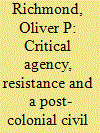

|
|
|
|
|
| Publication |
2011.
|
| Summary/Abstract |
IR's dominant theoretical and methodological approaches are, to varying degrees, compliance oriented. IR needs a theory of resistance if it is to survive its current methodological and ethical crisis. Resistance, read from a broadly Foucaultian perspective, is a process in which hidden, small-scale and marginal agencies have an impact on power, on norms, civil society, the state and the 'international'. This may be in the form of individual or grass-roots critical agency not coordinated or mobilized on a large scale but still globally connected. Such agency is often discursive and aimed at peaceful change and transformation. Through such critical agency a post-colonial civil society has emerged, which is transversal, transnational, fragmented, but may be constitutive of new, hybrid and post-liberal forms of peace.
|
|
|
|
|
|
|
|
|
|
|
|
|
|
|
|
| 5 |
ID:
077881


|
|
|
|
|
| Publication |
2007.
|
| Summary/Abstract |
An elaborate intellectual and policy framework has been constructed in order to preserve and protect "peace." The concept of peace is often used to refer to what Plato would have described as an "ideal form," or to depict a minimalist, realist-liberal version in which there is an absence of overt violence particularly between or within states. These common and differing usages illustrate that the concept of peace has generally been overlooked, and is often deployed in an ill-specified manner, while at the same time implying extraordinary levels of legitimacy. This article explores the consequences of not engaging with the concept of peace and outlines the possibilities inherent in opening up multiple conceptualizations of peace as a critical research agenda central to International Relations.
|
|
|
|
|
|
|
|
|
|
|
|
|
|
|
|
| 6 |
ID:
102683
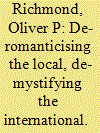

|
|
|
|
|
| Publication |
2011.
|
| Summary/Abstract |
Many actors involved in peacebuilding and statebuilding are acutely aware of the different roles of the 'local' in peacebuilding. Increasingly, this realisation has opened up tensions between the liberal peace and the realm of customary forms of politics and social structure. Peacebuilding may now be seen as a site of international assistance and local acquiescence, co-option or resistance. To understand these dynamics, the 'infrapolitics of peacebuilding' need to be uncovered. This article presents these dynamics in the cases of Timor Leste and the Solomon islands.
|
|
|
|
|
|
|
|
|
|
|
|
|
|
|
|
| 7 |
ID:
137636
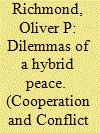

|
|
|
|
|
| Summary/Abstract |
Hybrid forms of peace represent a juxtaposition between international norms and interests and local forms of agency and identity. A first stage may be tense forms of hybrid politics that maintain structural violence, fail to resolve the contradictions between local and international norms, and reflect the outsourcing of colonial style rule. This could be characterised as, or lead to, a negative form of hybrid peace. A positive form of hybrid peace would have the advantage of having resolved such contradictions through active rather than passive everyday agency. This article examines this range of dilemmas surrounding debates about hybrid peace.
|
|
|
|
|
|
|
|
|
|
|
|
|
|
|
|
| 8 |
ID:
052503


|
|
|
| 9 |
ID:
080129


|
|
|
| 10 |
ID:
135284
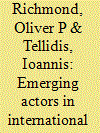

|
|
|
|
|
| Summary/Abstract |
Emerging actors in peacebuilding are generating a slow transformation of the norms and praxes of international peacebuilding, statebuilding, and development. Although each of the emerging donors have different contexts, approaches, motives, and methodologies, their power, influence, and—crucially— their nonadherence to the principles of the Development Assistance Committee of the Organisation for Economic Co-operation and Development have attracted scepticism and criticism from traditional donors. This article highlights the nuances of donors' engagement with peacebuilding and statebuilding. It examines whether they are critical or status quo states and what the implications are for practices of intervention.
|
|
|
|
|
|
|
|
|
|
|
|
|
|
|
|
| 11 |
ID:
181128
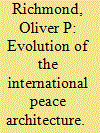

|
|
|
|
|
| Summary/Abstract |
The theories and doctrines related to peacekeeping, mediation, peacebuilding, and statebuilding, as well as other tools used to end war and conflict, raise a range of long-standing questions about the evolution and integrity of what might be called an international peace architecture. A narrow version of this term has begun to appear in the context of peacebuilding through the United Nations, the African Union, the European Union, other regional actors, the international legal system, and the International Financial Institutions. This article proposes a much broader, historical version, with six main theoretical stages, which have, from a critical perspective, produced a substantial, though fragile, international architecture.
|
|
|
|
|
|
|
|
|
|
|
|
|
|
|
|
| 12 |
ID:
123262
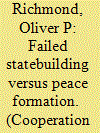

|
|
|
|
|
| Publication |
2013.
|
| Summary/Abstract |
This article outlines the often countervailing forces and norms of state formation, statebuilding and peacebuilding according to their associated theoretical approaches. It introduces a new concept of 'peace formation', which counterbalances a reliance on internal violent or externalised institutions' agency, reform and conditionality. Without incorporating a better understanding of the multiple and often critical agencies involved in peace formation, the states emerging from statebuilding will remain as they are: failed by design. This is because they are founded on externalised systems, legitimacy and norms rather than a contextual, critical and emancipatory epistemology of peace. Engaging with the processes of peace formation may aid international actors in gaining a better understanding of the roots of a conflict, how local actors may be assisted, how violence and power-seeking may be ended or managed and how local legitimacy may emerge.
|
|
|
|
|
|
|
|
|
|
|
|
|
|
|
|
| 13 |
ID:
141214
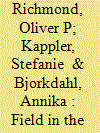

|
|
|
|
|
| Summary/Abstract |
This article highlights the semantic and socio-political meaning of the ‘field’ as it is used in both academic research and policy practices: as a geographic and material space related to forms of intervention in International Relations (IR), and not as a disciplinary space. We argue that the notion of the ‘field’ carries colonial baggage in terms of denoting ‘backwardness’ and conflictual practices, as well as legitimising the need for intervention by peacebuilding, statebuilding, and development actors located outside the field. We also show how academic practices have tended to create a semiotic frame in which the inhabitants of the research and intervention space are kept at a distance from the researcher, and discursively stripped of their agency. Along similar lines, policy-practice has reinforced the notion of the field as being in need of intervention, making it subject to external control. This article suggests that the agency of the inhabitants of the field has to be re-cognised and de-colonised so that political legitimacy can be recovered from ‘intervention’.
|
|
|
|
|
|
|
|
|
|
|
|
|
|
|
|
| 14 |
ID:
160807
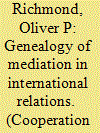

|
|
|
|
|
| Summary/Abstract |
What does it mean to mediate in the contemporary world? During the Cold War, and since, various forms of international intervention have maintained a fragile strategic and territorially sovereign balance between states and their elite leaders, as in Cyprus or the Middle East, or built new states and inculcated new norms. In the post-Cold War era intervention and mediation shifted beyond the balance of power and towards the liberal peace, as in Bosnia-Herzegovina, Kosovo, and Timor Leste. In the case of Northern Ireland, identity, territorial sovereignty, and the nature of governance also began to be mediated, leading to hints of complex, post-liberal formulations. This article offers and evaluates a genealogy of the evolution of international mediation.
|
|
|
|
|
|
|
|
|
|
|
|
|
|
|
|
| 15 |
ID:
052585
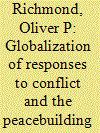

|
|
|
| 16 |
ID:
121250
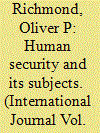

|
|
|
|
|
| Publication |
2013.
|
| Summary/Abstract |
The UN has changed the world by combining liberal internationalism,
the state, and liberal institutionalism, as well as by endeavouring to place
the subjects of security first. The notion of human security (HS) emerged
through these processes and through the convergence of various concepts,
including peacekeeping, human rights, development, and peace-building.
HS has been central to the UN's recent normative and legal impact and to
the UN's many peacekeeping and peace-building environments around the
world.
|
|
|
|
|
|
|
|
|
|
|
|
|
|
|
|
| 17 |
ID:
141474
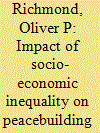

|
|
|
|
|
| Summary/Abstract |
Neoliberalism assumes that inequality creates productive competition and no risk of conflict where a viable state and social contract exists. From a critical position, inequality in a range of different forms (local to global in scale) weakens the links between civil society, solidarity, social justice, human rights and democracy. These positions have different implications for peace and order. State institutions are designed to make processes of consensual regulation permanent for the good of society. While continuing material inequality is inevitable, if the state and international community cannot mitigate its impact on security, rights and representation, in order to distribute a range of peace dividends, citizens rapidly begin to question the point of the state and undermine its legitimacy. Struggles over power, material resources and identity are thus untreated. This is especially problematic where the state also has been shaped through a peace agreement. Ironically, material inequality often lacking a Rawlsian justification of producing wider benefits of a peace dividend for society has been naturalised through peacebuilding and statebuilding, even though strong evidence suggests inequality is also at the root of many conflicts.
|
|
|
|
|
|
|
|
|
|
|
|
|
|
|
|
| 18 |
ID:
081206
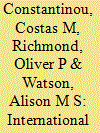

|
|
|
|
|
| Publication |
2008.
|
| Summary/Abstract |
We live in an interconnected, hyper-mediated world. A plethora of communications surrounds our everyday lives and polities, whilst new media and technologies have brought forth possibilities for, and ways of, communicating across space and time. Long-distance communication and travelling, the accelerated flow of information, ideas, images and sounds across national and other frontiers, the construction of multinational urban centres and global media corporations, the live broadcasting and commercialisation of major events and crises, the expansion of global advertising, spin and political marketing, and the advent of the Internet, have modified and complicated the reality of national, international and transnational relationships. This very collection of essays was made possible via the Internet to connect the Editors, based in different locations and while they were travelling. This is now the norm. Slightly more unusually, yet underlining the growing potential of this area, a workshop held at the University of St Andrews in November 2006 brought some of the contributors together both physically and virtually through the medium of Skype. Physical presence has long not been necessary in order to communicate, influence, or indeed, coerce
|
|
|
|
|
|
|
|
|
|
|
|
|
|
|
|
| 19 |
ID:
173914


|
|
|
|
|
| Summary/Abstract |
Recently there have been calls from policymakers around the world for practically engaged research to produce evidence-based policy for peace, security and development. Policymakers aim to align three types of methodological approaches to knowledge about peace, security and development in international order: methodological liberalism at state and international levels, aligned with ‘methodological everydayism’ in order to constrain methodological nationalism. Policy operates through broad forms of intervention, spanning military, governmental and developmental processes, which scholarship is expected to refine. Critical scholarship is sensitive about the subsequent ‘interventionary order’, often connecting methodological everydayism with global justice frameworks rather than methodological nationalism or liberalism.
|
|
|
|
|
|
|
|
|
|
|
|
|
|
|
|
| 20 |
ID:
077205
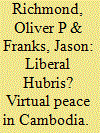

|
|
|
|
|
| Publication |
2007.
|
| Summary/Abstract |
The article examines the nature of the peace that exists in Cambodia by critiquing the 'liberal peace' framework. The authors claim that, despite the best efforts of international donors and the NGO community, liberal peacebuilding in Cambodia has so far failed in many of its key aims. The liberal peacebuilding project in Cambodia has been modified by a combination of local political, economic and social dynamics, international failings, and the broader theoretical failings of the liberal peacebuilding process. There have been some important successes, but serious doubts remain as to whether this project has been or can be successful, not least because of the ontological problem of whether the liberal peace is at all transferable. This raises the question of what type of peace has actually been built. The authors argue that the result of international efforts so far is little more than a virtual liberal peace
|
|
|
|
|
|
|
|
|
|
|
|
|
|
|
|
|
|
|
|
|